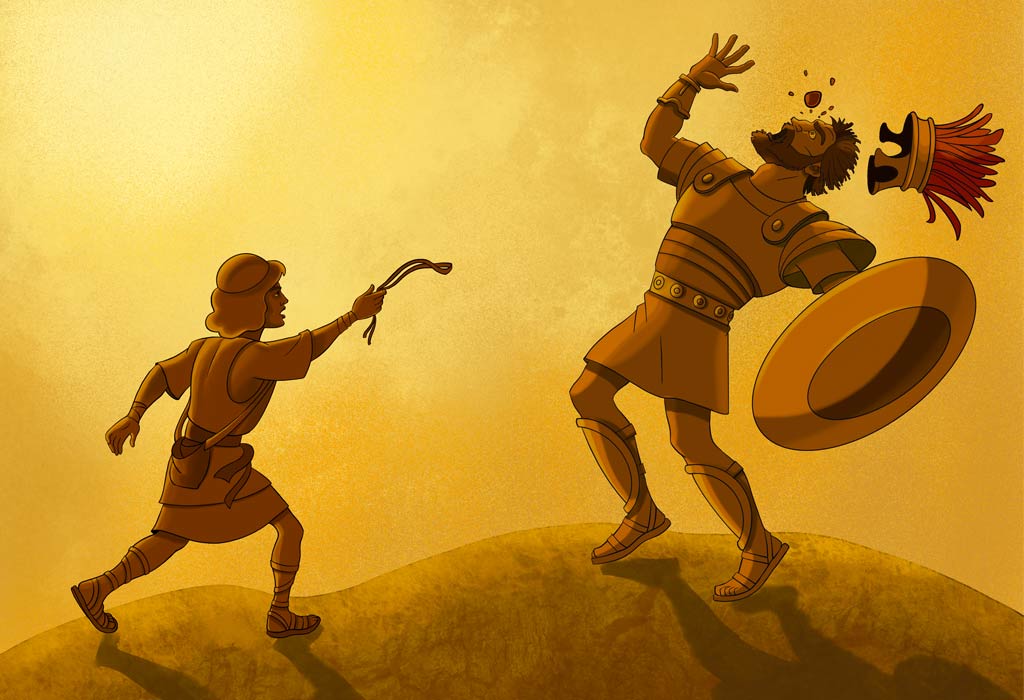
Certainly! Here's a narrative retelling of the story of King David as recorded in the Bible:
Once, in the ancient land of Israel, a young shepherd boy named David lived in the town of Bethlehem.
Little did he know that his life would take a remarkable turn that would make
him one of the most celebrated figures in history.
One day, the prophet Samuel received a divine message from God,
instructing him to anoint the future king of Israel from among the sons of
Jesse. Samuel arrived in Bethlehem and met Jesse and his sons. When he saw the
firstborn, Eliab, he thought surely this must be the chosen one, but God said,
"Do not consider his appearance or height, for I have rejected him. The
Lord does not look at the things people look at. People look at the outward
appearance, but the Lord looks at the heart."
One by one, Samuel met all the sons, but none of them was chosen.
Finally, he asked if there were any other sons, and Jesse mentioned David, the youngest, who was out
tending the sheep. Samuel sent for David,
and when he arrived, the Lord said to Samuel, "Rise and anoint him; this
is the one."
So Samuel anointed David with
oil in the presence of his family, and from that day forward, the Spirit of the
Lord came powerfully upon David.
David continued his shepherding duties until one day, he was summoned to the
court of King Saul, who was troubled by an evil spirit. David's skill with the lyre and his soothing music brought comfort
to Saul, and he was made one of Saul's armor-bearers.
David's fame spread rapidly after he single-handedly defeated the Philistine
giant Goliath, using nothing but a sling and a stone. The victory made him a
national hero and endeared him to the people of Israel.

Saul, however, grew increasingly envious of David's popularity and feared that David would take his throne. He made several attempts to kill David, forcing him to flee and become a
fugitive, hiding in the wilderness with his loyal followers.
Despite the hardships and dangers he faced, David refused to harm Saul, respecting him as God's anointed king.
On one occasion, he had the opportunity to kill Saul in a cave, but he merely
cut off a piece of Saul's robe, regretting even that small act afterward.
Eventually, Saul was killed in a battle with the Philistines, and David mourned the loss of his king.
Upon Saul's death, David became king
over the tribe of Judah, and later, all of Israel. He established Jerusalem as
the capital city and brought the Ark of the Covenant to reside there,
signifying God's presence among the people.
David's reign was marked by military victories and expansion of Israel's borders.
However, he also faced personal struggles, including his infamous affair with
Bathsheba, the wife of Uriah the Hittite. To cover up his sin, David arranged for Uriah's death, but
God was displeased, and the consequences of his actions haunted him.
:max_bytes(150000):strip_icc()/illustration-of-david-and-bathsheba-471862583-8a560968eea8422295f086eb44eeeb97.jpg)
In spite of his failings, David
was known for his genuine repentance and strong faith in God. He authored many
Psalms, expressing a wide range of emotions from praise and thanksgiving to
anguish and sorrow.
Toward the end of his life, David
faced a rebellion led by his son Absalom, causing immense grief and turmoil.
The rebellion was eventually quelled, and Solomon, David's son with Bathsheba, was appointed as his successor.
King David died after a reign
of forty years, leaving behind a legacy of a man after God's own heart, a
warrior, a poet, and a king who united and led the nation of Israel through its
golden age. His story continues to inspire and captivate people to this day,
reminding us of the complexities of human nature and the enduring power of faith
and redemption.


